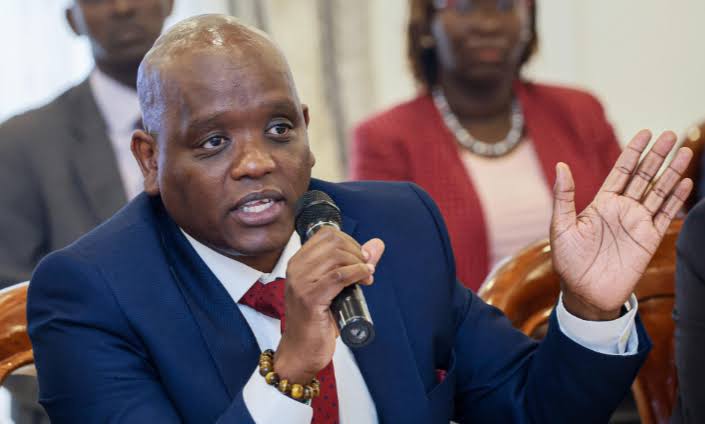
 Dennis Itumbi during a past event/FILE
Dennis Itumbi during a past event/FILE Head of Creative Economy and Special Projects Dennis Itumbi has criticised the recent arrest of four Kenyan filmmakers.
The police has since released the four filmmakers arrested Friday night and booked for “false publication” without charges.
Nicholas Wambugu Gichuki, Brian Adagala, Mark Karubiu, and Christopher Wamae have been released on free bond on Saturday morning at Pangani police station but without their devices, lawyers say.
In a tweet, Itumbi described the police action as “unnecessary” and an infringement on creative freedom.
“It is unnecessary to arrest filmmakers merely for making a film,” Itumbi stated.
He stressed that artists should be allowed to tell diverse stories without facing intimidation.
This, as he urged the creative industry to respond by offering alternative narratives.
“There is an alternative story on the violence and political planning that unleashed the storming of Bunge and invading the armory at the Mausoleum, make an alternative documentary; tell the other story. The BBC told their story. Let them be.”
However, in a statement on Saturday from the BBC Press Office, the four filmmakers were not involved in the making of the exposé.
"We have been made aware of the arrest of four journalists in Kenya. To confirm, they were not involved in any way in the making of BBC Africa Eye's Blood Parliament documentary," the statement from BBC reads in part.
Kenyan activist Boniface Mwangi also clarified that the four work in his organisation, Sema Ukweli.
"They are my colleagues at Sema Ukweli and their arrest is worrying because they were not involved in the production of Blood Parliament. Some of the things confiscated belong to our organisation and it's concerning that our government is afraid of the truth," Mwangi posted on Instagram.
The four filmmakers, Nicholas Wambugu, Brian Adagala, Mark Denver Karubiu, and Christopher Wamae, were arrested on Friday night from their studio in Karen under unclear circumstances.
Their filming equipment and data storage devices were also seized during the raid.
They were held separately at Pangani and Muthaiga Police Stations before being released Saturday on free bond.
However, their lawyers confirmed that their devices have not yet been returned.
The filmmakers were reportedly facing charges related to publishing false information and cyberbullying, though details about the alleged offenses remain unclear.
Their arrest sparked outrage within the local and international creative communities, with the Kenya Film and Television Professionals Association (KFPTA) condemning the action as an attempt to criminalise filmmaking.
“We stand in full solidarity with our arrested colleagues, their families, and the entire creative community,” said the KFPTA chairperson Ezekiel Onyango, pledging legal and institutional support to ensure justice and the protection of filmmakers’ rights.
According to sources familiar with the matter, detectives had been trailing the group for questioning related to the BBC documentary, though no official charges have been filed.
The arrests come in the wake of BBC Africa Eye’s release of a 40-minute exposé alleging that Kenyan security forces used live ammunition on anti-tax protesters outside Parliament during the June 2024 Gen Z protests.
The film has sparked public outrage and drawn international attention to alleged extrajudicial killings.
In response, Director of Public Prosecutions Mulele Ingonga has ordered the Independent Policing Oversight Authority (IPOA) to investigate the events surrounding the protests.
Ingonga emphasized the documentary raised “serious concerns” about the use of force, possible misconduct, and violations of public order.
Given that some personnel involved may belong to the military, legal experts are calling for a broader investigation beyond IPOA’s remit.
Still, the DPP stressed the importance of an impartial and transparent probe, stating, “This matter is of public interest and touches the heart of our democratic values.”








